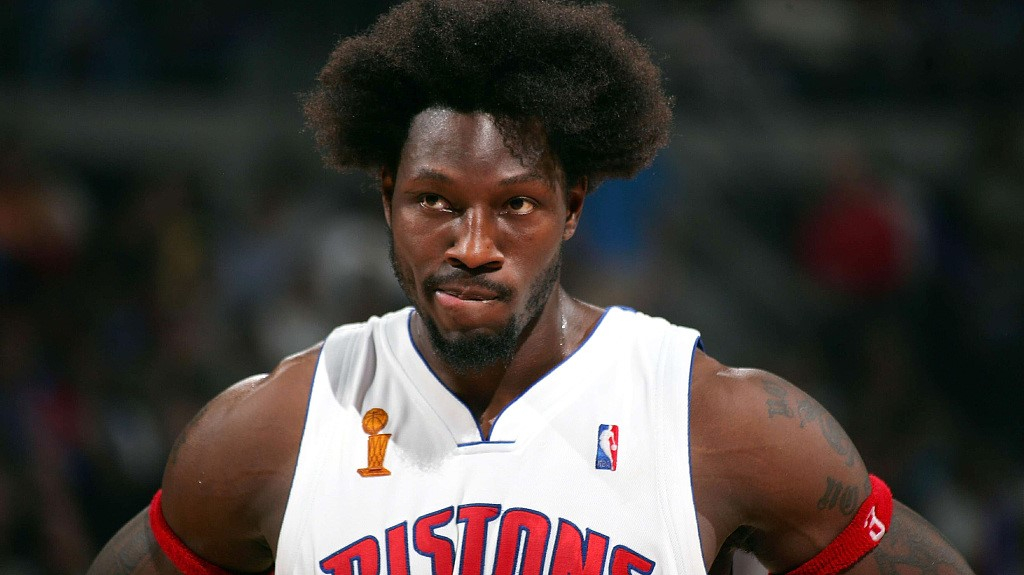
Four-time Defensive Player of the Year, 2004 NBA champion, Ben Wallace of the Detroit Pistons. /VCG
Four-time Defensive Player of the Year, 2004 NBA champion, Ben Wallace of the Detroit Pistons. /VCG
When we talk about the 1996 NBA Draft, one of the three greatest drafts in league history, we always thought of players like Kobe Bryant, Allen Iverson, Steve Nash, Ray Allen. Here's a guy who also entered the NBA in 1996. Though he was undrafted, he's great enough to be remembered – his name is Ben Wallace.
In summer 1996, 22-year-old Ben Wallace joined the Washington Bullets (Wizards in the future). He was the substitute of Chris Webber. Every time the coach sent him to the court, he spared no efforts trying to get every rebound, block every shot and never hesitated to commit fouls.
Part of this had something to do with Ben Wallace's habit of playing basketball during childhood: no one would pass the ball to him and he had to snatch the ball all by himself. The other reason was that he knew each number on his stats sheet might decide how much he would make from his next contract, or if he ever got another contract.
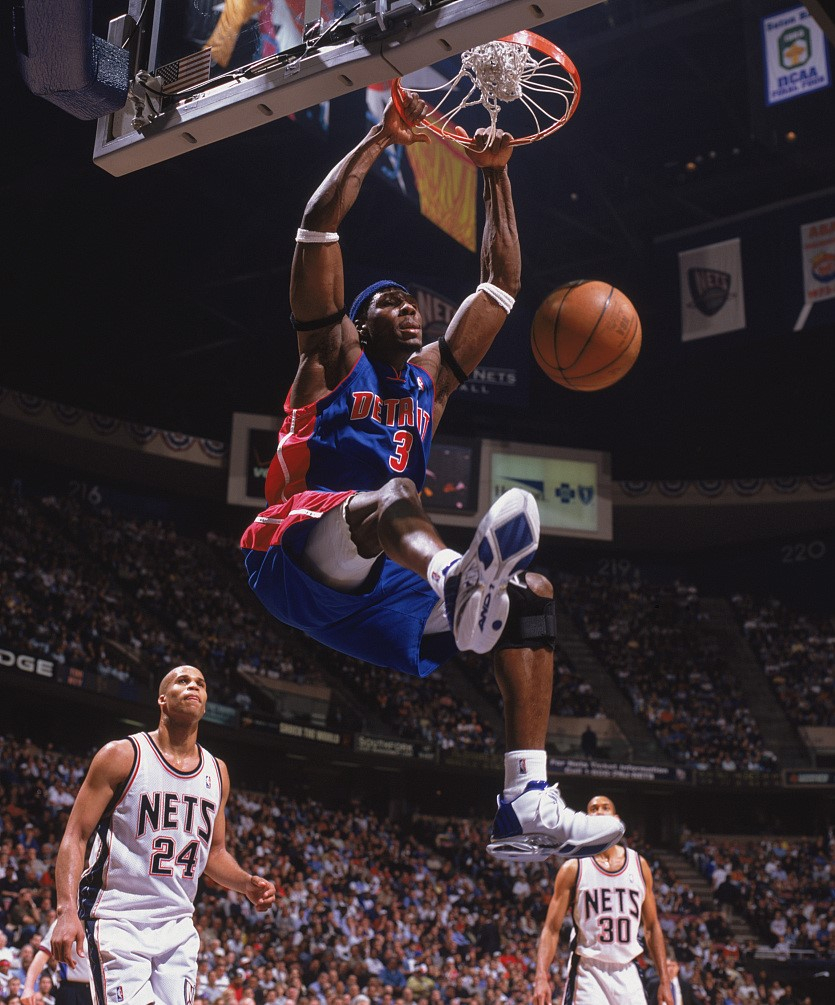
Ben Wallace #3 of the Detroit Pistons dunk in the Eastern Conference Finals against the New Jersey Nets at the Continental Airlines Arena in East Rutherford, New Jersey, May 22, 2003. /VCG
Ben Wallace #3 of the Detroit Pistons dunk in the Eastern Conference Finals against the New Jersey Nets at the Continental Airlines Arena in East Rutherford, New Jersey, May 22, 2003. /VCG
Ben Wallace's efforts paid off. Instead of playing no longer than a quarter in each game, he got to play as a starter sometimes (after Webber left). The opponents' coaches began to frown at this 2.01-meter-tall muscular monster because he could be a real trouble in defense. In the 1999-2000 season, Ben Wallace even started 81 out of 82 games in the Orlando Magic.
Of course, so far, he only upgraded from nobody to a qualified blue-collar center. The center of the stage belonged to Shaquille O'Neal, who helped the Los Angeles Lakers win the 2000 NBA Championship with unprecedented dominating performance.
In that summer, Ben Wallace was kissed by luck. The NBA Commissioner David Stern introduced zone defense to the league. This gave the perimeter players the opportunity to compete with their big-man teammates to be the offensive ace.
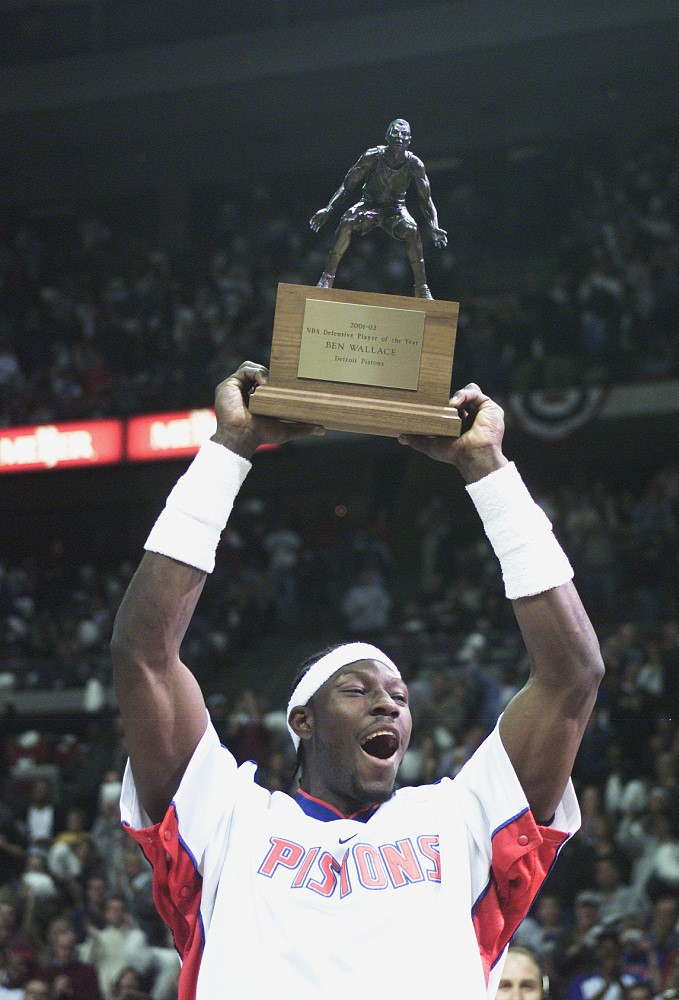
Ben Wallace of the Detroit Pistons celebrates with his Defensive Player of the Year trophy before Game 1 of the NBA playoffs against the Toronto Raptors at the Palace of Auburn Hills in Auburn Hills, Michigan, April 21, 2002. /VCG
Ben Wallace of the Detroit Pistons celebrates with his Defensive Player of the Year trophy before Game 1 of the NBA playoffs against the Toronto Raptors at the Palace of Auburn Hills in Auburn Hills, Michigan, April 21, 2002. /VCG
Limited by his 2.01-meter-height, Ben Wallace was never a top one-on-one defender, especially when he had to those face seven footers by himself. Nonetheless, his speed and quickness enabled him to follow the perimeter players when they broke into the paint and deny their shots.
Having been traded to the Detroit Pistons, Ben Wallace made local fans from the first season. His 6.4 points, 13.2 rebounds and 2.3 blocks per games were great, but what's more impressive was that he showed Detroit fans something they had been missing for so long: ferocious fouls of Bill Laimbeer, killing blocks of John Salley and ridiculous rebounding of Dennis Rodman. Ben Wallace could do all of that by himself.
The NBA began to recognize him for his defense. In the 2001-2002 season, Ben Wallace was the league's rebounding champion, blocking leader and Defensive Player of the Year (DPOY). The last three guys who received the three honors in the same season were Kareem Abdul-Jabbar, Bill Walton and Hakeem Olajuwon.
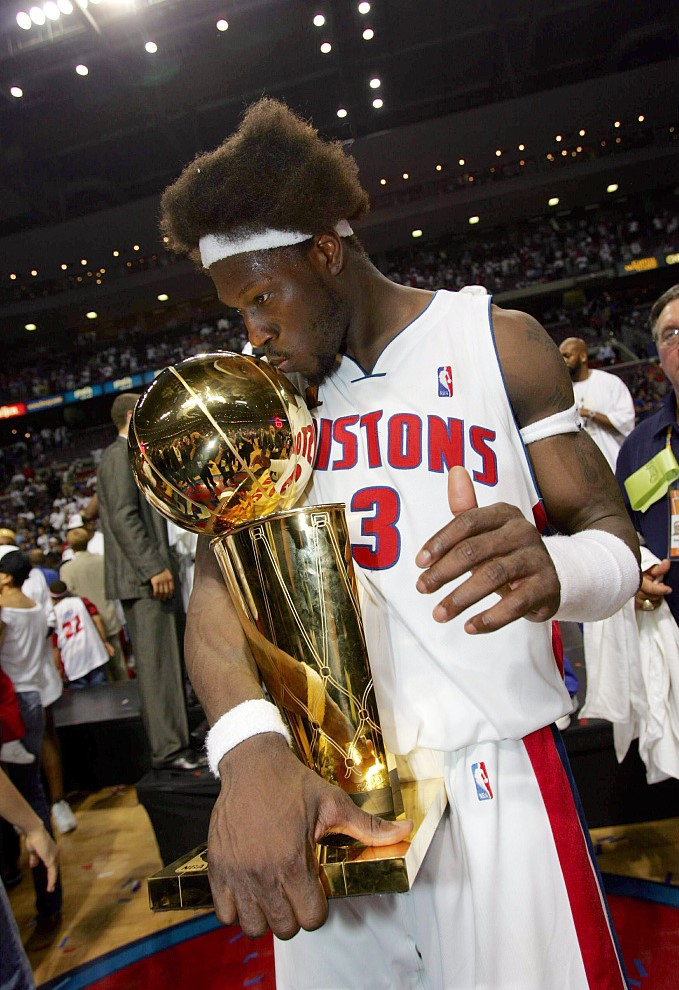
Ben Wallace #3 of the Detroit Pistons walks away with the Larry O'Brien NBA Championship Trophy after the Pistons defeat the Los Angeles Lakers 4-1 in the NBA Finals at the Palace of Auburn Hills, June 15, 2004. /VCG
Ben Wallace #3 of the Detroit Pistons walks away with the Larry O'Brien NBA Championship Trophy after the Pistons defeat the Los Angeles Lakers 4-1 in the NBA Finals at the Palace of Auburn Hills, June 15, 2004. /VCG
Having tortured the league's offensive geniuses for another two years, Ben Wallace was in luck again. Larry Brown took over as the head coach of the Pistons. In February, 2004, another Wallace, Rasheed Wallace joined the team.
Brown, as an old-school coach, loved defense and his defensive system was somehow built for the Pistons. A seasoned, smart point guard (Chauncy Billups), a tall, first-class defender for small forward (Tayshaun Prince), a top one-on-one defender for power forward (Rasheed Wallace) and a historic help defender (Ben Wallace).
Operating like a machine, the Pistons marched into the 2004 NBA Finals and then beat the Lakers which had "Big 4" – O'Neall, Bryant, Karl Malone and Gary Payton – 4-1 to win their third championship in franchise history.
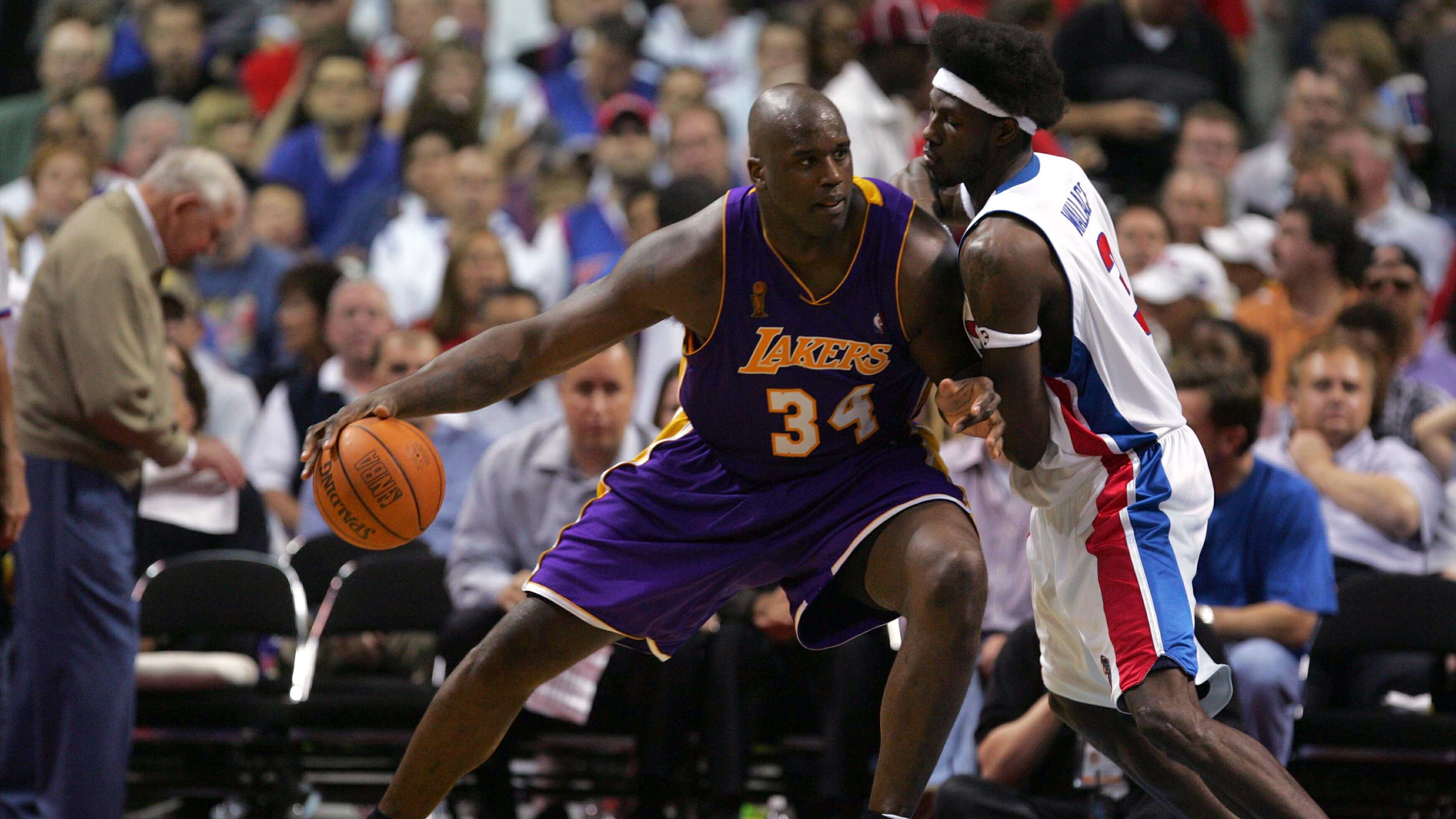
Shaquille O'Neal #34 of the Los Angeles Lakers posts up against Ben Wallace of the Detroit Pistons in Game 4 of the NBA Finals at the Palace of Auburn Hills, June 13, 2004. /VCG
Shaquille O'Neal #34 of the Los Angeles Lakers posts up against Ben Wallace of the Detroit Pistons in Game 4 of the NBA Finals at the Palace of Auburn Hills, June 13, 2004. /VCG
Though he's not working alone, Ben Wallace did an excellent job of defending O'Neal. Usually, it should be Rasheed Wallace to take on the opponents' best big man, but Ben Wallace had his own way on O'Neal.
Since he's only 2.01 meters tall, Ben Wallace could never stop 2.16-meter-O'Neal from shooting. However, O'Neal lacked shooting range. When Ben Wallace used his strong lower body to keep O'Neal away from the paint, the giant lost his power. Moreover, with better explosiveness and equally strong upper body, Ben Wallace was always able to grab the rebound before O'Neal.
In 2004, Ben Wallace reached the peak of his career, but was also about to meet his turning point. In that summer, Stern introduced the "No Handcheck" rule to the NBA. From the new season, players were no longer allowed to place and keep their hands on an opponent unless they are in the area near the basket with his back to the basket.
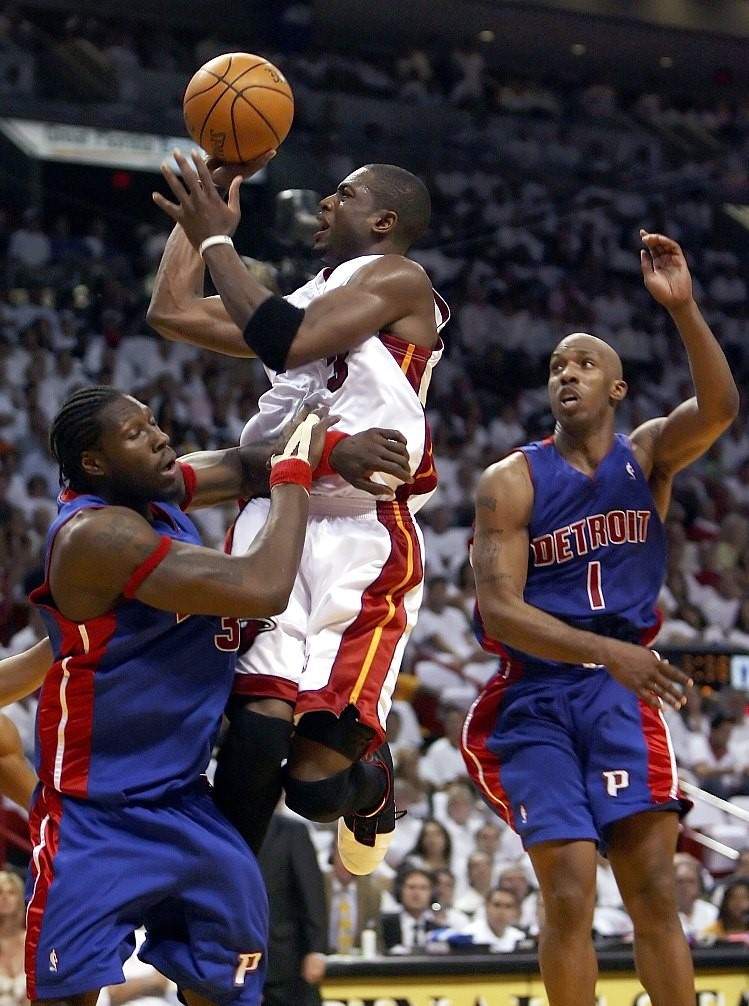
Dwyane Wade (C) of the Miami Heat shoots the ball over Ben Wallace (L) of the Detroit Pistons in Game 3 of the Eastern Conference Finals at the American Airlines Arena in Miami, Florida, May 27, 2006. /VCG
Dwyane Wade (C) of the Miami Heat shoots the ball over Ben Wallace (L) of the Detroit Pistons in Game 3 of the Eastern Conference Finals at the American Airlines Arena in Miami, Florida, May 27, 2006. /VCG
This gave perimeter slashers even bigger roles in offense, but shook Detroit's defensive system. In the following two seasons, the team watched rookie Dwyane Wade destroy their defense like a hot knife through butter. Detroit were still able to make the Eastern Conference Finals but they were more like the last test for the new kings in the East.
Furthermore, Ben Wallace was tired of the Auto City. Here Billups was the NBA Finals MVP, Richard Hamilton was the team's scoring leader, even local media preferred Rasheed Wallace for his witty remarks.
The Pistons offered 52 million U.S. dollars for four years to keep him, but Ben Wallace turned it down and signed a four-year, 60-million-deal with the Chicago Bulls. Having claimed one blocking leader, two rebounding titles, four DPOY trophies and one NBA Championship, 32-year-old Ben Wallace departed for the Windy City.
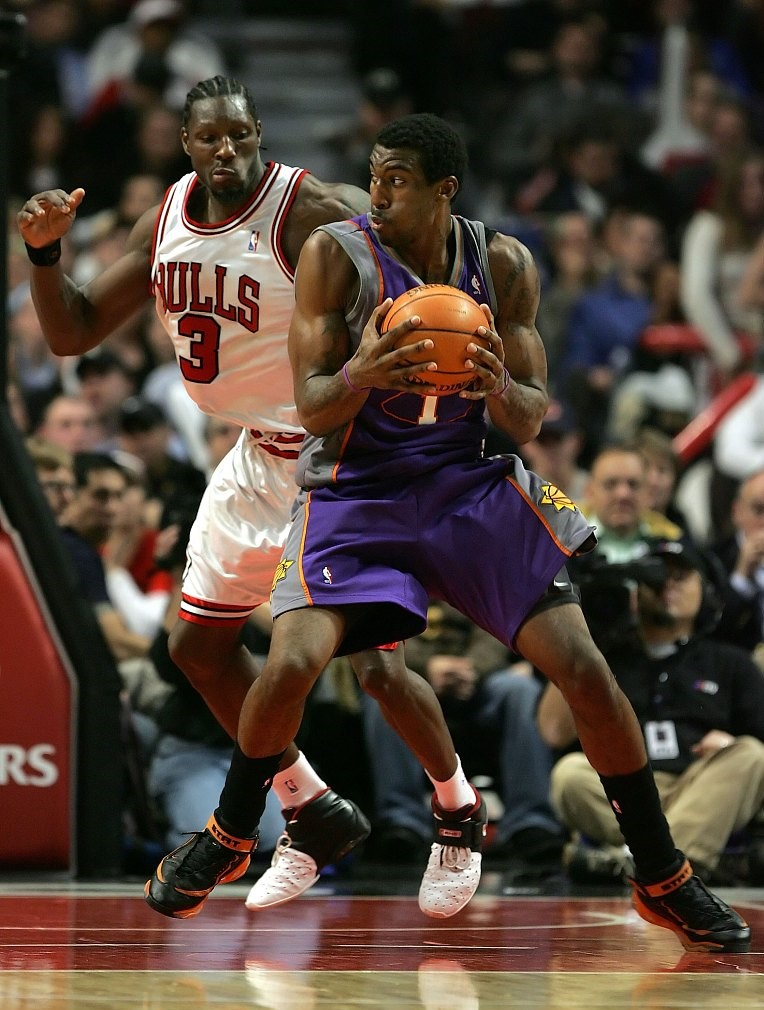
Amare Stoudemire #1 of the Phoenix Suns tries to break through the defense of Ben Wallace #3 of Chicago Bulls in the game at the United Center in Chicago, Illinois, January 2, 2007. /VCG
Amare Stoudemire #1 of the Phoenix Suns tries to break through the defense of Ben Wallace #3 of Chicago Bulls in the game at the United Center in Chicago, Illinois, January 2, 2007. /VCG
It took the Bulls less than a year to regret landing Ben Wallace. He could still get 10+ rebounds but only occasionally. What was more memorable were the following moments: he allowed 21-year-old Dwight Howard to go 9-12 and score 27+11 over his head; he only had four rebounds but committed five fouls while watching Tyson Chandler claim 17 rebounds; he got zero points and rebound facing Samuel Dalembert.
Moreover, Ben Wallace began to challenge head coach Scott Skiles. Despite his terrible field goal and free throw rates, he wanted a bigger offensive role, and he tried to get it via his ridiculous shooting attempts on the court. Ben Wallace also refused to apologize after he violated Skiles' "no headband" rule or get fined by the Bulls after listening to music loudly in the locker room.
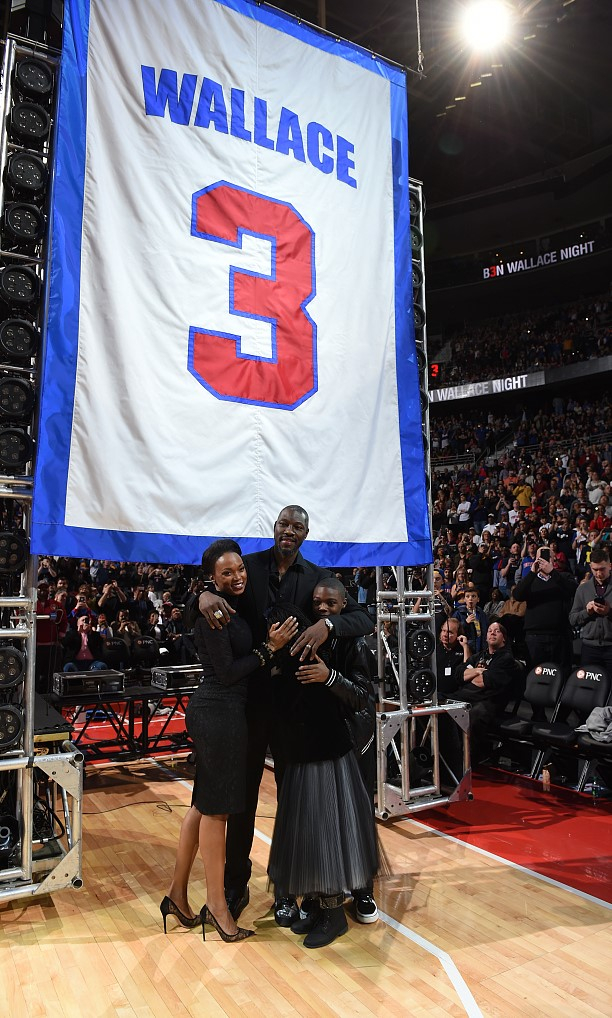
Ben Wallace and his family attend his retiring ceremony of his No. 3 Jersey at the Palace of Auburn Hills, January 16, 2016. /VCG
Ben Wallace and his family attend his retiring ceremony of his No. 3 Jersey at the Palace of Auburn Hills, January 16, 2016. /VCG
One thing for sure, Ben Wallace never got he wanted since then. He's aging, which took away his strength and athleticism. Without Detroit's system, his weakness was magnified. Fortunately, he managed to return to Detroit in the end and had his No. 3 jersey retired there.
In fact, Ben Wallace was always after the same thing: respect. When he was in Washington, Orlando and in his first three years in Detroit, he spared no efforts on the court because he wanted respect and he had to earn it via performance. After he won a ring, he thought teams should show him respect by letting him shoot more in the game, paying him more money and granting him some privileges like wearing a headband. Nonetheless, for a blue-collar player like him, respect only came in his best years and left before he could even realize.
At least please remember his name used to be standing by the greatest defenders in NBA history.